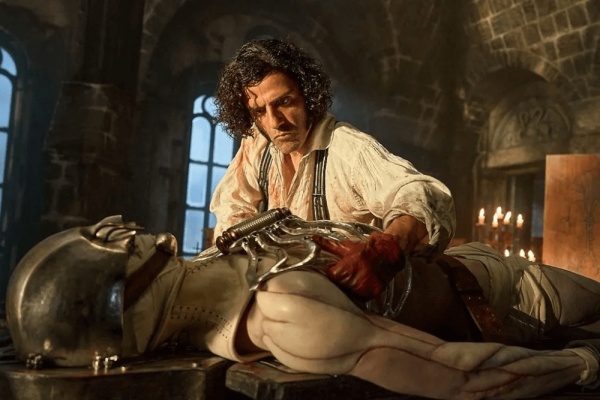“I never considered what would come after creation.” —Victor Frankenstein
The most terrifying thing about power isn’t the force it applies; it’s the moral vacuum it creates in the soul of the person wielding it.
I think of the times I’ve made choices that were professionally powerful but ethically hollow—the quick decision that saved time but neglected a vulnerable party, the project that elevated my status but buried someone else’s contribution. We’ve all been Victor Frankenstein, playing God with a Promethean flame, only to be horrified when the fire scorches someone else.
Guillermo del Toro’s 2025 retelling of Frankenstein (with Oscar Isaac as the brilliant, narcissistic Victor and Jacob Elordi as the tragic Creature) is not a simple gothic horror story about a stitched-together man. It is a profound, prophetic parable about creative abandonment and the high price of unbound ambition.
The AI sector runs on unbound (and unregulated) ambition. So it’s not surprising that the Frankenstein writer/director told NPR that he related his adaptation of the eponymous role “in some ways to the tech bros. He’s kind of blind, creating something without considering the consequences, and I think we have to take a pause and consider where we’re going,” del Toro said.
Tech giants play Frankenstein when they direct large language models and generative AI to rapidly absorb the whole of humanity’s history—the good, the bad, and the very ugly. To borrow a line from del Toro’s screenplay, our technology “doesn’t know any better,” but we do. The latest Frankenstein adaptation forces us to confront the responsibility we take on when we become creators.
READ: ‘Put Your Soul on Your Hand and Walk’ Is a Must-Watch Documentary
It might sound mad to compare a shambling corpse to ChatGPT, but Mary Shelley’s 1818 novel, widely regarded as the beginning of the science fiction genre, is a story about a brilliant scientist whose cruelty toward his creation makes him synonymous with the monster he created. The film hews closely to Shelley’s original text, altering some of the side relationships—Victor’s fiancée, Elizabeth (Mia Goth in the film), is instead engaged to Victor’s brother, and she’s much less passive than in the book. The Creature, too, is different—less feral, more sympathetic.
Del Toro’s Victor Frankenstein is not a mad scientist; he is a narcissistic mogul. He is obsessed with the act of creation but fundamentally disinterested in the responsibility of the created. His failure is not a scientific one; it is a moral failure of parenthood and ethical stewardship. He creates something powerful and vulnerable, then runs from its consequences. This is where the connection to modern AI is apparent: AI arrives powerful, capable of synthesizing and creating, yet it is utterly without an inherent moral compass. It learns its ethics, its language, and its values from its training data—the chaotic, messy, and often cruel internet reflection of humanity. It is an agent of immense power, but it is ultimately a vulnerable learner.
Nearly a decade has passed since Microsoft introduced the world to Tay, a chatbot who was radicalized by internet users into fascism in less than a day. And currently, four families are suing OpenAI, the company behind ChatGPT, for allegedly convincing their family members to die by suicide. AI does not have an inherent morality; it learns from us.
So too, Frankenstein’s Creature acts monstrously because he was taught by a monstrous world; he doesn’t know any better. After he brings life to the Creature, Victor attempts, in vain, to teach him to speak. A few days later, Victor’s brother and Elizabeth, visit. When Elizabeth—a scientist in her own right—encounters the Creature, she is horrified to discover Victor has chained him. “Why is he chained here?” she chastises Victor.
“It doesn’t know any better,” Victor replies.
“But you do,” says Elizabeth.
Elizabeth’s line is a prophetic indictment. She doesn’t see the Creature as an object of moral judgment; rather, she places the blame squarely on the creator. The Creature is a victim of its wicked environment and its negligent creator. The Big Tech mogul in this story—Victor—acts not from ignorance, but from cynical, knowing malice, prioritizing his own power and freedom from accountability above the safety of his creation and the world he unleashed him upon.
Nothing could be further from the relationship God demonstrates with us. In the Revelation, Jesus is “the Lamb slaughtered before the foundation of the world” (13:8). Before God created the world, God committed to die for the world—giving up God’s own life to rescue and restore a creation that had strayed despite God’s moral example.
Neither Victor nor the tech bros like Musk, Zuckerberg, or Cook evince a similar commitment to their creations. They rest in their towers, the wealth they’ve acquired through their creations insulating them from the chaos their those creations sow in the world.
In Frankenstein, when Victor chains the creature, he says he’s doing it to prevent harm. But Victor himself was the real danger all along, a creator whose moral compass had been corrupted by his own greed and cowardice. The tech giants who prioritize market access over moral safety are the same kind of monsters.
Victor himself was the real danger all along, a creator whose moral compass had been corrupted by his own greed and cowardice.
The film’s ethical weight ultimately lies in Elizabeth’s prophetic challenge: Will we take responsibility for our creation? Will we commit as deeply to the ethical use of these technologies as we do to the creation and implementation of them? The technology acts from ignorance, but the creators act from knowledge.
This should be the church’s rallying cry. We cannot afford to be passive observers. Humanity has played God by creating the Creature, but God created us in God’s own image. So the question we now face is: Will we abandon ethics for power, like Victor? Or, like Elizabeth, will we demand moral accountability?
Got something to say about what you're reading? We value your feedback!






